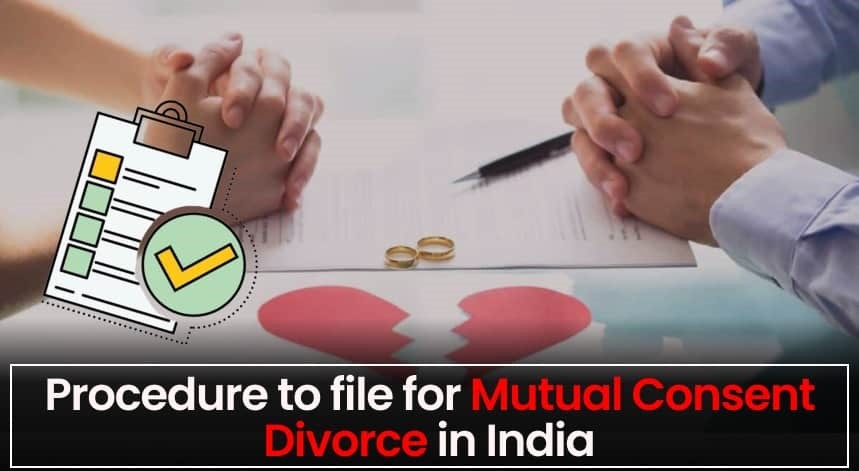
-
- Filing of a petition: To commence the process, both spouses must jointly present a petition seeking the dissolution of their marriage and requesting a divorce decree. The grounds for this petition typically include either a period of one year or more of living separately or an acknowledgment that living together is not feasible, and both parties have mutually agreed to end the marriage. This petition is signed by both spouses.
-
- Appearing before the Court and scrutiny of the petition: Following the submission of the petition, both parties, accompanied by their respective counsels or lawyers, must appear before the family court. The court meticulously examines the petition and accompanying documents. While the court may attempt reconciliation between the parties, if such efforts prove futile, the divorce proceedings continue.
-
- Passing of orders for the recording of statements on oath: Upon satisfaction with the scrutiny of the petition, the court may issue orders for the recording of sworn statements from both parties.
-
- Order on First Motion and passing of 6 months period before Second Motion: After recording the statements, the court issues an order based on the first motion. Subsequently, a mandatory waiting period of six months is imposed before the parties can proceed with the second motion. The deadline for filing the second motion is set at a maximum of 18 months from the date of presenting the divorce petition to the family court, unless the petition is withdrawn during this timeframe.
-
- Second Motion and Final Hearing of the Matter: Following the decision of the parties to proceed with the legal process and participate in the second motion, they can advance to the conclusive hearings. This phase entails the appearance of the parties before the Family Court to provide statements. Notably, the Supreme Court has recently ruled that the six-month waiting period, originally mandated, can be waived at the court’s discretion. Consequently, if the court deems that the waiting period would only prolong the parties’ suffering and the issues, including alimony, child custody, or other pending matters, have genuinely been resolved, it has the authority to waive the six-month cooling-off period. Failure to initiate the second motion within the stipulated 18-month timeframe results in the court refraining from decreeing the divorce. Importantly, either party retains the right to withdraw their consent before the decree is granted.
- Decree of Divorce: In a mutual divorce scenario, both parties must have provided their consent, and there should be no disagreements concerning matters such as alimony, child custody, maintenance, or property. Consequently, a comprehensive agreement between the husband and wife is imperative for the dissolution of the marriage. If, upon hearing the parties, the court is convinced that the allegations in the petition are valid, reconciliation is impractical, and cohabitation is not possible, it can issue a decree of divorce, officially declaring the marriage dissolved based on the facts and circumstances of the case. The divorce attains its finality upon the court’s pronouncement of the divorce decree.
- Proof of residence for both husband and wife.
- Professional and financial details, including current earnings, of both spouses.
- Marriage certificate.
- Information about the family background of the parties.
- Wedding photographs of the husband and wife.
- Evidence demonstrating that the spouses have lived separately for over a year.
- Proof of unsuccessful attempts at reconciliation.
- Income tax statements of both parties.
- Details of the property and assets owned by the husband and wife.
What are the documents/information required for Divorce by Mutual Consent?
Provision’s in the Law for Mutual Consent Divorce
In India, divorce laws provide for the possibility of mutual agreement between couples seeking separation. Different marriage acts apply to various communities. Hindus, under Section 13B of the Hindu Marriage Act 1955, are required to undergo a minimum one-year separation. The Special Marriage Act 1954, through Section 28, facilitates mutual consent divorce. The Divorce Act 1869 mandates a two-year minimum separation under Section 10A. Parsi couples adhere to the Parsi Marriage Act 1936, while Christians and Muslims follow their respective religious laws.
Irrespective of their religious affiliation, individuals in both married and separated situations often strive to uphold the sanctity and significance of marriage. In such cases, individuals may explore a reconciliation process through third-party intervention, such as mediation or counseling, before opting for divorce. If these reconciliation efforts prove unsuccessful, the petitioner may proceed with a divorce application, provided both parties are in agreement.
How much time does it take to get a Mutual Consent Divorce?
A mutual consent divorce can be finalized within six months, but not until after the first year of marriage has passed. There is a required six-month waiting period between the initial and final divorce motions, although the court may waive this interval in specific situations. Generally, mutual consent divorces are concluded in approximately 18-24 months.
